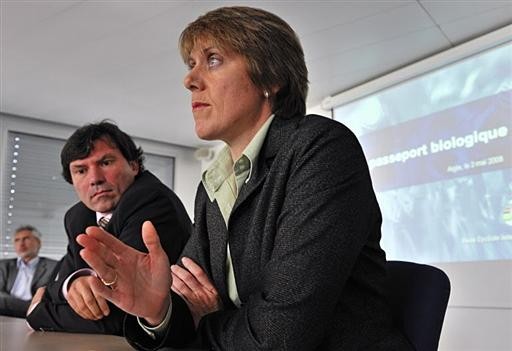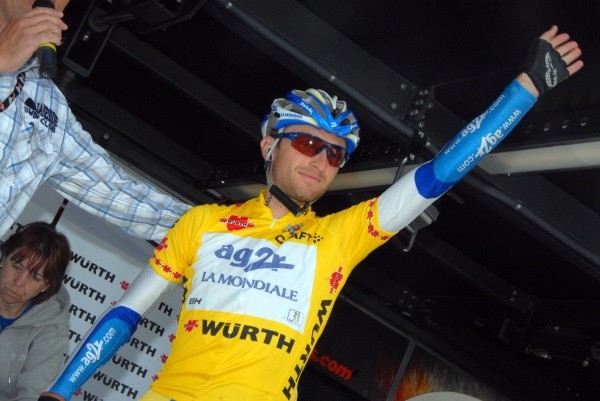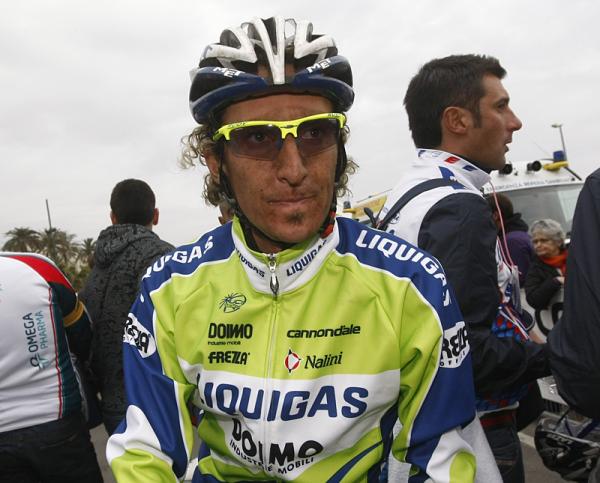Gripper concerned over bio passport publishing
Former UCI anti-doping boss recalls payment made by Armstrong



Anne Gripper, the former head of the Anti-Doping Department at the UCI, has warned professional riders about the pitfalls of publicly publishing their biological passport data. Gripper, who left her post in March 2010, was reacting to the news that Floyd Landis had questioned Bradley Wiggins data 2009 Tour de France. Landis's remarks were later removed from the Versus website, where they appeared in January.
Landis claimed that his own blood values from the 2006 Tour de France were similar to that of Wiggins's, who released his data in the aftermath of the 2009 Tour in a bid to quash any speculation that his fourth place finish was down to anything but hard work and a strong period of form.
"I'm sure Landis wouldn't consider himself an expert in the analysis of blood profiles," Gripper told Cyclingnews.
"He's making probably what is a legitimate comment for him - he's saying 'Ok, that profile looks like mine, and here's the conclusion I draw'. I haven't actually seen his comments, but if that's what he's saying, then it's legitimate on one level, because he's saying in his opinion, it looks like his, but what that means, and is there any relevance, any scientific validity to that, I'm not sure."
Wiggins's data was released by Slipstream Sports less than a week after the 2009 Tour de France and were backed up by team's ethos to race with full transparency. In 2008 they performed a similar act, releasing Christian Vande Velde's data after the American also finished fourth.
"I had quite a few conversations with Jonathan [Vaughters] before Bradley released his results, but it really wasn't about the profile at all, it was more just about the working precedent," Gripper said.
"I cautioned Jonathan about whenever you release anything like that you'll always have amateur armchair haematologists and physiologists putting their spin on what the numbers are showing.
Get The Leadout Newsletter
The latest race content, interviews, features, reviews and expert buying guides, direct to your inbox!
"At that point there was nothing of concern in the profile, and my conversations with Jonathan were not about the profile itself, it was more about the concept of releasing it.
"I don't recall what the profile was. I certainly would've known when I was talking with Jonathan if the profile had been reviewed by the experts and if there were any issues with the profile, so the fact that there was none of that in our discussion indicated that as far as the profile went, it was OK."
The Biological Passport came into full effect in 2008 with the first doping violation cases opened in 2009. Other than Wiggins and Vande Velde, few riders have publicised their data. Ivan Basso published some test results on his Mapei training web page last year, while Lance Armstrong followed suit after the Tour de France, publishing his test results. They were later scrutinised by Dr Jakob Mørkeberg who told DR Sport, "It could be that he received some blood transfusions. This is not to say that he has [definitely] received one, but it could be an explanation."
Gripper is now cautious when it comes to riders releasing their data.
"I've probably modified my views on that - if riders want to do it, then they put themselves at the mercy of anyone who wants to interpret whatever they interpret from that. You can look at the profile, but unless you're a Michael Ashenden, who's building it, you can really put whatever protection you like on it.
"Because I think it undermines what we've engaged the experts to do, and what they spend hours of their own time analysing and agonising over. It really undermines their expertise, particularly when you have the media picking up on some scientist from the University of Lyons or something that says 'I think this' because it's controversial.
"So I would still caution riders doing that unless everybody does it and it’s a level field. People can sit back and think they can interpret these things, but it's very technical to do it. I know, just from dealing with the nine scientific experts we had, how specialised this concept of interpreting a profile is, and to be honest, to get the full picture you actually need different types of experts."
Crunch time for the Passport?
Recent appeals against the UCI's passport have come as a blow to the anti-doping initiative. Tadej Valjavec and Franco Pellizotti both have cases lodged with the Court of Arbitration for Sport (CAS), disputing the UCI's rulings that they have violated any doping codes.
Gripper worked at the UCI when both cases were first opened and stands by her former employer's decision to press ahead with the initial cases.
"I sat through the experts' consideration of those profiles, I'm absolutely rock-solid sure that they are legitimate cases to have opened, absolutely, so I would be very, very disappointed if CAS upheld the decision on either of those," she said.
"If CAS upheld the decisions based on technical reasons, like because the blood wasn't transported at certain temperature, then I think we can say OK, sure, in the early days we were getting those logistical things sorted, and we know what we've got to do in the future.
"If, however, they overturn it on the basis of the invalidity of indirect detection as a method, then that's a bad thing. But if it's just "you've got to be more careful at transporting the samples at between four and twelve degrees Celsius, then I don't think that undermines the whole programme, that just says in this instance there's enough possible confounding factors that we can't go forward with this case as a rule violation."
Corruption at the core
Landis's allegation of UCI cover-ups and corruption have yet to be fully investigated, however last week Sylvia Schenk, formerly of the UCI management committee (from 2000 to 2005), warned, "It depends on how you define corruption, whether you only take into account criminal law infringements or the abuse of power for personal advantage, as Transparency International defines it," and called for a full investigation into the UCI.
Like Schenk, Gripper saw no direct corruption at the UCI during her time, although she does recall one of the payments made by Lance Armstrong to the governing body during her early career there.
The seven-time Tour de France winner signed a personal cheque for $25,000 in 2002 and then his management company Capital Sports and Entertainment made a second payment of $100,000 in 2005.
"I think I was actually working at the UCI when one of the payments came in [ed. second payment], and I just remember getting a note from the finance department just saying we've received this from Lance Armstrong, and not really understanding - it was very early when I was there - but there was no cover-up or anything - just the finance clerk saying we'd got this cheque."
Asked if she thought whether it was a mistake to accept any form of donation from an athlete, she added: "I do think you have to be careful in accepting payments from any of your stakeholders, unless there's a very clear reason for doing so. And I think even Pat [McQuaid] has admitted that he considers that it was a mistake to do that. We shouldn't have accepted that payment."
Daniel Benson was the Editor in Chief at Cyclingnews.com between 2008 and 2022. Based in the UK, he joined the Cyclingnews team in 2008 as the site's first UK-based Managing Editor. In that time, he reported on over a dozen editions of the Tour de France, several World Championships, the Tour Down Under, Spring Classics, and the London 2012 Olympic Games. With the help of the excellent editorial team, he ran the coverage on Cyclingnews and has interviewed leading figures in the sport including UCI Presidents and Tour de France winners.
